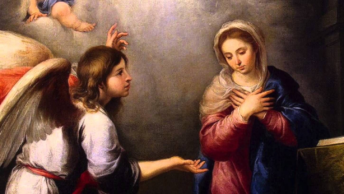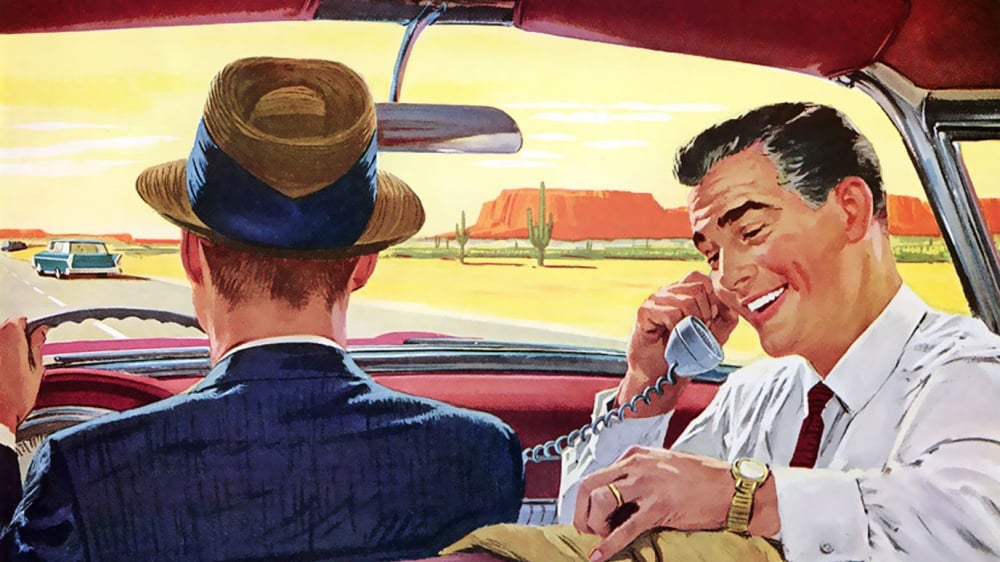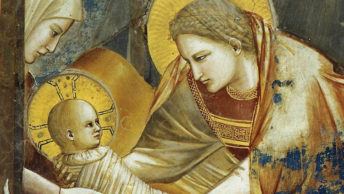Once upon a time there was a fabulously wealthy king who also happened to be a very good man. He truly desired to grow closer to God—but he also wanted to remain rich and comfortable. “After all,” he thought, “I am a king, so I deserve a life of luxury—plus it’s what everyone expects of me. God wouldn’t have made me so rich if He didn’t want me to enjoy myself.” This self-serving or convenient idea contented the king for a while, but eventually he realized he wasn’t growing any closer to the Lord. Wondering why this was, he became discouraged, and even wondered if it was worth trying anymore.
One night the king was asleep in his comfortable, luxurious bed, located near the top of his beautiful palace, when he was awakened by a fearsome stomping from up on the roof. Going out on the balcony, the king shouted, “Who’s up there?” A voice shouted back, “A friend. I’m sorry to have awakened you, your majesty, but I’m looking for my lost camel.” This ridiculous answer angered the king, and he screamed, “You fool! Why are you looking for a camel on a roof?” The unseen voice responded back to the king, “You fool! Why are you looking for God while you wear silk pajamas and lie in a bed made of gold?” These simple words went directly to the king’s heart, humbling and convicting him. From that time on he lived much more simply, went on to find God, and became a great saint (Paul J. Wharton, Stories and Parables for Preachers and Teachers, p. 10).
As the king learned, we can only grow closer to God on His terms, not our own. Whether we’re coping with wealth or poverty, success or failure, joy or sorrow, God must come first. If we become discouraged over our spiritual lives, we can choose to give up or cut our losses—but then our efforts to that point may prove to be wasted. The better choice is to accept God’s plan, even when we don’t understand it.
The readings for the Third Sunday of Advent remind us that God has a plan; it’s something wonderful—but it proceeds according to His timetable, not our own. Over 500 years before Christ, Jerusalem had been conquered by the Babylonians, and the people led away into exile. Because of their sinfulness, God allowed them to be taken away from the Promised Land. However, He did not forget them. The prophet Isaiah (35:1-6, 10) announced that the Jews would one day return to Israel; Jerusalem would be rebuilt, and the land would be enriched, renewed, and transformed, resulting in great blessing and rejoicing. Part of Isaiah’s prophecy was soon fulfilled; after seventy years of captivity, the Jewish people were able to return and rebuild their holy city, Jerusalem. Part of the prophecy was fulfilled by Jesus over 500 years later, for He opened the eyes of the blind and the ears of the deaf; He healed the lame and the mute. The remainder of the prophecy will be fulfilled at the end of time, when Christ’s Kingdom is complete, resulting in everlasting joy. God’s wondrous design will be brought to perfection, but according to His divine timetable. Even people of faith sometimes need to be reminded of this. The early Christians looked forward to the Lord’s return, but when this didn’t happen right away, some of them became discouraged. In the 2nd Reading St. James (5:7-10) urges them to be patient and to imitate the example of a farmer who knows that the seed will bear fruit at the appointed time. As we see in the Gospel of Matthew (11:2-11), even St. John the Baptist had his doubts. Rather than living a comfortable life in a palace, he had lived a harsh life in the desert, and up until the time he was arrested and imprisoned, worked mightily to prepare the way of the Lord. Using his own powerful personality as a model, John likely expected a great and dominating king who would punish the wicked, smite Israel’s enemies, and free the land from Roman rule. When Jesus turned out to be a very different kind of Messiah, John wondered if in fact He was the One who had been foretold. As we see in the Gospel, Jesus reminded John that He was fulfilling the prophecies, and added, “Blest is the one who finds no stumbling block in Me.”
Do we find the way of Christ to be a stumbling block or obstacle? Certainly there are times when the Gospel makes little sense to us; we can easily create a litany of “why” questions.
Why does God allow Christians to be persecuted throughout the world? Why do so many of our national or societal leaders seem to get away with corruption or greed, without any apparent outrage or demand for justice on the part of our fellow citizens? Why do the wicked seem to prosper, while the just seemingly have many different crosses to bear? Why must life have so many disappointments? Why is it sometimes so hard to feel God’s presence, even though we really want to find Him?
Perhaps part of the answer is that sometimes we’re looking for God or for truth or for understanding in the wrong places; we may be searching for the Lord while trying to remain in the comfortable palaces and mindsets and routines of our lives, when instead we should be going out into the desert: not a literal desert, but the symbolic desert of sacrifice, openness, and self-surrender. That sort of desert may seem rather barren and uninviting, but it is possible to live there; we are capable of saying to God, “Lord, I don’t understand why these things are happening to me; I don’t like them, and I don’t know how much longer I can bear them—but I trust in You, I know that You are with me, and I ask only that You help me bear my cross and know and do Your will.” This sort of prayer, offered in humility and faith, can be very powerful, and is very pleasing to God.
Jesus offers a cross to everyone, and He gives each of us the choice of whether or not to accept it. For many people, the cross is a stumbling block, and when God’s plan becomes too uncomfortable or confusing or demanding, they choose to go their own way. If we are truly to be the Lord’s disciples, this must not be our response to discouragement, worry, or doubt. As John the Baptist came to realize, Jesus is the One sent by God, the One Who offers to take away our sins, and the One Whose Kingdom will last forever. He invites each of us to follow Him. We are not called to understand, but to believe, to accept, and to trust—for this alone is the path that leads to eternal life.








